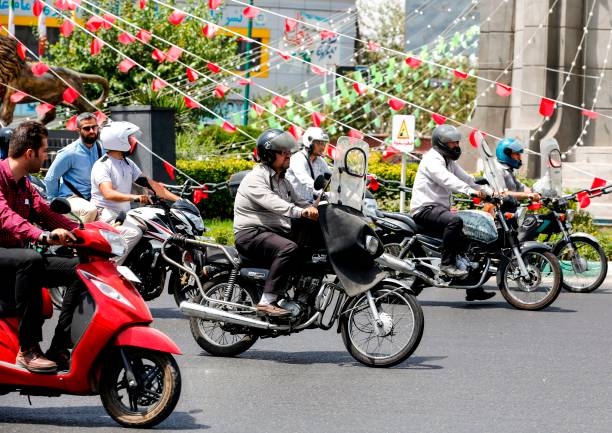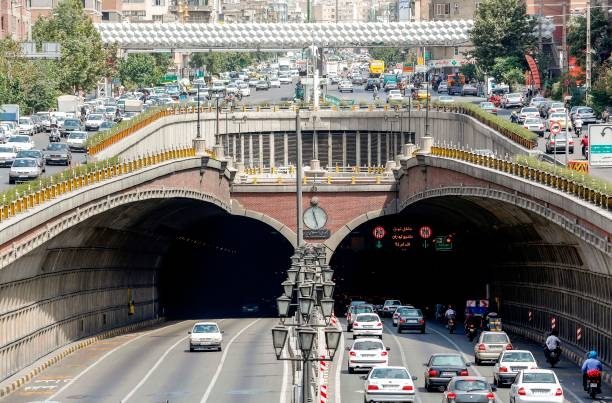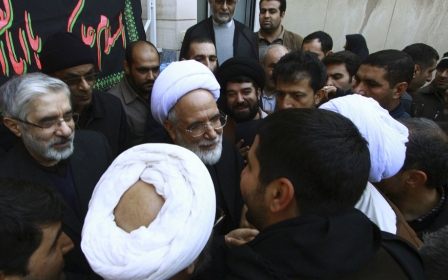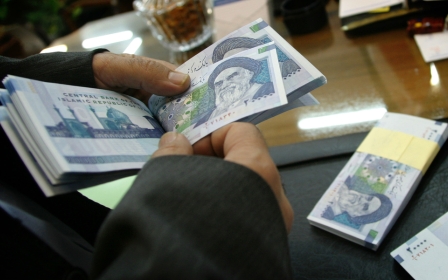Iranians begin to feel the heat as power outages strike during hot summer

TEHRAN, Iran - Every day, Mohsen Khakhki wakes up early to bake bread for people who want to have Barbari bread, a type of Iranian flatbread on their breakfast table. He bakes bread three times a day, but he has recently faced a serious problem - constant power outages.
“Lately, a few times, when I had prepared the bread flour, the power outage occurred, and this caused me not to be able to bake the bread. So the flour went rotten," he told Middle East Eye.
Yousef Allahverdi, 35, a supermarket owner in Pasdaran Street, situated in the north of Tehran, said many of his customers can’t pay him money when the power cuts happen.
“My point of sale (POS) device doesn’t work during a power outage, and people can't do the payment. I need both internet and electricity to make the POS work," said Allahverdi.
Meanwhile, a short video has been published on Iranian media, showing the effects of a power failure during surgery.
Blackout bedlam
With the start of summer in Iran, power outages - which used to happen rarely - unexpectedly disrupt people’s lives. The power outages have affected most parts of the country, including the capital Tehran, but they appear to be more frequent in northern and southwestern provinces.
Milad Rahmani, a public relations student in Langarud, located in the northern province of Gilan, told MEE: “Here in Langarud, we are having blackouts two times a day that last two hours every time.”
Nevertheless, in Tehran, where the high temperatures are frustrating people, the government has sought to prevent more electricity failures across the city.
However, Mahmoud-Reza Haghi-Fam, a high ranking official in Iran’s energy ministry, warned on 21 May that if Iran's electricity consumption reached 60,000 megawatts, provinces including Tehran, Mazandaran, Sistan & Baluchestan, Hormozgan and Khuzestan would have power cuts.
'Energy consumption in Iran is four times more than the world [average] and we should increase energy efficiency, and people should be taught not to waste it'
- Masoumeh Ebtekar, Iran's vice president on women and family affairs
Energy ministry officials have declared that the power outages are occurring because of high temperatures, poor equipment and a reduction in output from hydroelectric plants due to low rainfall.
This is not the first time that Iran has undergone mass power failures. In 2001, an unexpected and abrupt growth in the simultaneous consumption of power led to the collapse of the electricity network and pervasive blackouts.
Meanwhile, the energy ministry has proposed one week's holiday per month in summer in order to decrease the power consumption - a proposal that has so far not been accepted
In line with government strategies for reducing electricity failures, government organisations have been ordered to open their offices at 6:10 AM and close at 2PM. So far the plan has been seen as successful as it has decreased the power and water consumption by 25 percent.
According to energy ministry officials, each degree rise in temperature in Iran increases the power consumption by 1500 megawatt and in Tehran by 150 to 200 megawatts.
Rouhani blamed
On 11 July, the conservative Vaten-e-Emrooz newspaper blamed Rouhani's government for the recent power cuts.
The daily argued that a promise not to increase the capacity of power plants due to the 2015 Paris agreement (which commits signatories to reducing greenhouse gas emissions) was causing the consecutive power failures in Iran.
"There are evidences that indicate that the [mismanagement of the government] in increasing the country's power plants' capacity is perhaps related to a certain commitment by Mr. Rouhani's administration on the international scene, and this commitment will be an obstacle in the way of expanding the capacity of plants in the next years," stated Vatan-e-Emrooz on 11 July.
The newspaper, which is one of the main opponents of Rouhani, added: "Based on the plan Iran's Department of Environment submitted to United Nations Framework Convention on Climate Change in 2015, Iran is committed to decreasing greenhouse gases until 2030 by 12 percent, and not increasing [the number of] the plants in accordance with the country's needs may be related to this issue ... developing the [power] plants will result in the growth of fossil fuels, and the administration of Mr Rouhani has vowed to decrease the consumption."
'Look at European countries, they have less resources than Iran, but they never face the problem of power failures. We haven’t worked on our infrastructure'
- Esmail Kahrom, former government adviser
The paper added that "greenhouse gas is produced as the result of burning fossil fuels. And 85 percent of the country's power is the product of thermal power plants which use fossil fuels."
In response to the paper's claims, Masoumeh Ebtekar, the former head of the Department of Environment and the current Vice President on Women and Family Affairs, denied the reports.
"The Paris agreement is related to the years after 2020, and has been passed [by the government] for countering climate change, the phenomenon which has caused many of the world countries including Iran to face serious problems like drought," she wrote on 13 July.
"Prohibition of producing energy and consuming fossil fuels aren't mentioned in the Paris agreement, but the issue of the increase of efficacy and correcting the energy consumption pattern has been included [there]. This issue has nothing to do with setting up power plants and generating power. Currently, the consumption in Iran is four times more than the world [average] and we should increase energy efficiency and people should be taught not to waste it."
In an interview with MEE, Esmail Kahrom, a former adviser to the head of Iran's Department of Environment, emphasised that the latest power cuts had no relation to Paris agreement.
"The Paris agreement has no relation to the recent power outages. The agreement forced the developed and industrial countries to decrease their greenhouse gases immediately, and it also asked countries like Iran to decrease their greenhouse gases after 2020."
Iraq spillover
The power outages in Iran have prompted a sharp reduction in power exports to neighbouring Iraq, which has seen mass demonstrations against a lack of electricity among other public services, primarily located in the south of the country.
Energy minister Reza Ardakanian described the halting of electricity exports to Iraq as "based on an agreement [with Iraq]".
"In a situation [where] we face a strong need, the priority would be supplying our own needs," he said on 7 July.
"Our neighbouring countries are in much need of electricity, especially in summer, and a part of their needs are supplied through the [energy] lines of Iran. We are in constant contact with the Iraqi side, and Iraqi's minister of energy was recently in Iran and became aware about out limitations."
Iran's state channel, Al-Alam TV, suggested on 17 July that the power outages were being used by Iran's enemies as an excuse to attack the country.
"Foreign media namely Saudi [outlets] have created a poisoned atmosphere against the Islamic Republic of Iran and are trying to [depict] Iran's stop of power exports to Iraq as a leverage against Iraq, and [also for] creating unrests."
It added that they had "strived to take advantage of the current situation, and to create an anti-Iran wave [in Iraq] in order to get concessions in the matter of electing the future prime minister of Iraq."
Kahrom told MEE: "We have had no progress in the field of generating electricity. And the reason behind the outages is this issue. Look at European countries, they have less resources than Iran, but they never face the problem of power failures. We haven’t worked on our infrastructure. "
"Besides, the sanctions have caused our power plants to go out of service - the plants are old and the sanctions have forced foreigners not to sell us the parts we need to use in our plants."
New MEE newsletter: Jerusalem Dispatch
Sign up to get the latest insights and analysis on Israel-Palestine, alongside Turkey Unpacked and other MEE newsletters
Middle East Eye delivers independent and unrivalled coverage and analysis of the Middle East, North Africa and beyond. To learn more about republishing this content and the associated fees, please fill out this form. More about MEE can be found here.




